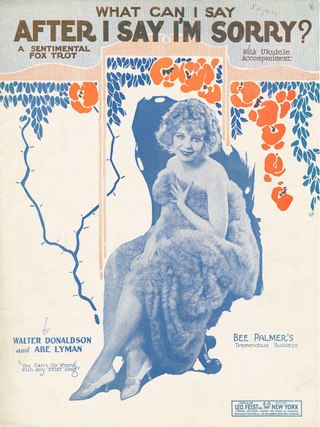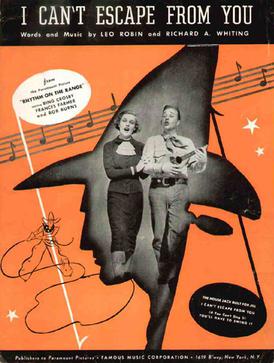Related Research Articles
"Can Anyone Explain? " is a popular song written by Bennie Benjamin and George David Weiss and published in 1950.
"Thinking of You" is a popular song, composed by Harry Ruby with lyrics by Bert Kalmar. It was introduced in the Broadway show, The Five O'Clock Girl (1927) when it was sung by Mary Eaton and Oscar Shaw.
"My Dreams Are Getting Better All the Time" is a 1945 popular song.
"The One I Love " is a popular song composed by Isham Jones with lyrics by Gus Kahn. The song was recorded by Isham Jones' Orchestra on December 21, 1923, at Brunswick Studios in New York City, and published on January 7, 1924. On January 17 in Chicago, Jones recorded another version, with Al Jolson on lead vocals. Both versions made the charts that Spring, with Jolson's peaking at number 2, and Jones' at number 5. Sophie Tucker recorded her version February 1924, released on Okeh 40054.

"Somebody Loves Me" is a popular song, with music written by George Gershwin, and lyrics by Ballard MacDonald and Buddy DeSylva. The song was published in 1924 and featured in George White's Scandals of 1924.
"Put 'em in a Box, Tie 'em with a Ribbon, and Throw 'em in the Deep Blue Sea" is a popular song. The music was written by Jule Styne, the lyrics by Sammy Cahn. The song was published in 1947, and was further popularized in the 1948 movie Romance on the High Seas, where it was sung by Doris Day accompanied by the Page Cavanaugh Trio. The lyrics deal with a person who is through with love and therefore metaphorically wants to throw everything away in a box into the sea.
"Fine and Dandy" is a popular song from the 1930 Broadway musical of the same name.

"Nobody's Sweetheart", also known as "Nobody's Sweetheart Now" and "You're Nobody's Sweetheart Now", is a popular song, written in 1924, with music by Billy Meyers and Elmer Schoebel, and lyrics by Gus Kahn and Ernie Erdman. The song is a jazz and pop standard.
"The Lamp Is Low" is a popular song of the 1930s. The music was written by Peter DeRose and Bert Shefter, adapted from Pavane pour une infante défunte, a piece by Maurice Ravel. The lyrics were written by Mitchell Parish.
"The Lady's in Love with You" is a popular song which was written by Burton Lane (music) and by Frank Loesser (lyrics). The song was published in 1939 and introduced in the film "Some Like It Hot" (1939) when it was sung by Bob Hope and Shirley Ross. Ms Ross also sang it in the film with Gene Krupa and His Band. The song was sung by Tony Bennett at his final concerts, at Radio City Music Hall, in 2021.

"Why Was I Born?" is a 1929 song composed by Jerome Kern, with lyrics written by Oscar Hammerstein II.
"Mean to Me" is a popular song with music by Fred E. Ahlert and lyrics by Roy Turk, published in 1929. Hit versions that year were by Ruth Etting and by Helen Morgan. Ben Bernie and the Hotel Roosevelt Orchestra also recorded what might be the first male version in February 1929 with vocals by Scrappy Albert.
"Trust in Me" is a song written by Ned Wever, Milton Ager, and Jean Schwartz. Popular versions in 1937 were by Mildred Bailey and by Wayne King & his Orchestra.

"What Can I Say After I Say I'm Sorry?" is a popular song by Walter Donaldson and Abe Lyman, published in 1926.
"Flamingo" (1940) is a popular song and jazz standard written by Ted Grouya with lyrics by Edmund Anderson and first recorded by singer Herb Jeffries and the Duke Ellington Orchestra on December 28, 1940, for Victor Records. This briefly reached the Billboard charts in 1941.

"Runnin' Wild" is a popular song first composed and recorded in 1922, written by Arthur Harrington Gibbs with lyrics by Joe Grey and Leo Wood.
Liza " is a song composed by George Gershwin with lyrics by Ira Gershwin and Gus Kahn. It was introduced in 1929 by Ruby Keeler in Florenz Ziegfeld's musical Show Girl. The stage performances were accompanied by the Duke Ellington Orchestra. On the show's opening night in Boston on June 25, 1929, Keeler's husband and popular singer Al Jolson suddenly stood up from his seat in the third row and sang a chorus of the song, much to the surprise of the audience and Gershwin himself. Jolson recorded the song a few days later on July 6, 1929, and his rendition rose to number nine on the charts of the day.
"For You" is a song written by Joe Burke and Al Dubin in 1930. It was introduced in the Mack Sennett short Billboard Girl (1931) when it was sung by Bing Crosby.
Moanin' Low is a popular torch song. The music was written by Ralph Rainger; the lyrics by Howard Dietz. The song was published in 1929 and was introduced that same year in the musical revue The Little Show by Libby Holman becoming a hit and Holman's signature song. A recording by The Charleston Chasers was also popular in 1929.

"I Can't Escape from You" is a song written music by Richard A. Whiting and lyrics by Leo Robin for the 1936 Paramount Film "Rhythm on the Range", and first introduced in the film when Bing Crosby sang it to Frances Farmer. Crosby recorded it for Decca Records that same year with the Jimmy Dorsey Orchestra and it was in the hit parade for 11 weeks reaching a peak position of No. 7. Crosby recorded the song again in 1954 for his album Bing: A Musical Autobiography.
References
- ↑ Whitburn, Joel (1986). Joel Whitburn's Pop Memories 1890-1954 . Wisconsin, USA: Record Research Inc. p. 566. ISBN 0-89820-083-0.
- ↑ "YouTube.com". YouTube.com. Archived from the original on 2021-12-19. Retrieved September 2, 2018.
- ↑ "allmusic.com". allmusic.com. Retrieved September 2, 2018.
- ↑ "Jack Hylton". jackhylton.com. Retrieved September 2, 2018.
- ↑ "The Online Discographical Project". 78discography.com. Retrieved September 2, 2018.
- ↑ "vThe Online Discographical Project". 78discography.com. Retrieved September 2, 2018.
- ↑ "A Crosby Discography". BING magazine. Retrieved September 2, 2018.
- ↑ "The Online Discographical Project". 78discography.com. Retrieved September 2, 2018.
- ↑ Painting the Clouds with Sunshine, 1951 cast album
- ↑ "The Online Discographical Project". 78discography.com. Retrieved September 2, 2018.
- ↑ "sepiarecords.com". sepiarecords.com. Retrieved September 2, 2018.
- ↑ "Discogs.com". Discogs.com. Retrieved September 2, 2018.
- ↑ "Discogs.com". Discogs.com. Retrieved September 2, 2018.